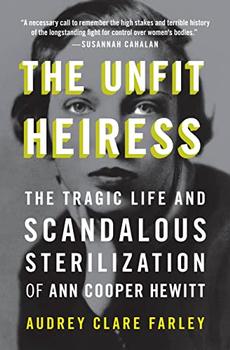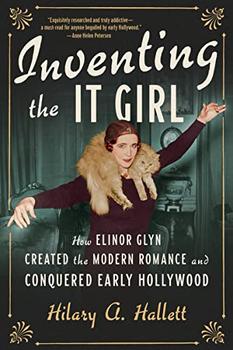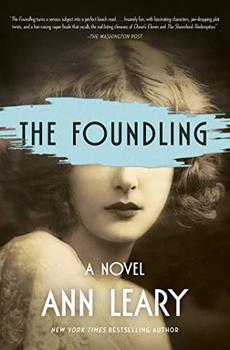Summary | Excerpt | Reviews | Beyond the book | Read-Alikes | Genres & Themes | Author Bio

The Tragic Life and Scandalous Sterilization of Ann Cooper Hewitt
by Audrey FarleyDuring the American eugenics movement (see Beyond the Book), involuntary sterilization was used to keep poor people, sick people and Black people from reproducing. While there have been scant reparations to victims, most of these incidents have gone unnoticed by the general public. However, when a white daughter of wealth, Ann Cooper Hewitt, was sterilized against her will at the age of 20, the world was stunned. Doctors had been duped by Ann's mother Maryon into believing that Ann was "feeble-minded," which was considered grounds for eugenic sterilization. When Ann, who underwent the procedure without knowledge or consent, discovered what had happened to her, she was livid and sued her mother for half a million dollars in compensation. The city of San Francisco put the doctors on trial and the press went into a frenzy writing about Ann and this very odd case.
The Unfit Heiress: The Tragic Life and Scandalous Sterilization of Ann Cooper Hewitt centers the events that unfolded amidst a patriarchal era. Women's bodies were sliced open, often without their consent; fallopian tubes were cut or pulled out. While eugenics now is often associated with the likes of Adolf Hitler, the Nazis were influenced by American involuntary sterilization practices, which were at one time adopted by 30 states and upheld by the Supreme Court.
In 1910, decades before Ann was involuntarily sterilized, biologist Charles Davenport founded the Eugenics Record Office at Cold Spring Harbor Laboratory in New York. He believed that criminality, hypersexuality, poverty and poor intelligence were genetic traits that could be erased by controlling the population through sterilization. He was horrified by the "unfit," a category that included immigrants, freed slaves, the indigent and anguished, the unwell and uneducated. Davenport hired field workers to collect data on families to form the basis for his opinions about epileptics, alcoholics, prostitutes and others he considered morally deviant. The findings were presented to politicians and government agencies to promote sterilization programs.
While the growing culture of eugenics and selective breeding programs was feared by the underclass, it also gave socialite Maryon Cooper Hewitt the loathsome idea to have her own daughter sterilized. Maryon lacked a moral compass but excelled at finding rich husbands to bankroll her lifestyle. Peter Cooper Hewitt, Ann's father, was a prominent scientist and inventor who helped Thomas Edison perfect the electric storage battery. Nerdy Peter was delighted that Maryon took an interest in him while he and his wife Lucy were estranged. However, he eventually became lukewarm towards Maryon. And then Ann was born. Everything Maryon hated about Ann, Peter adored. He divorced Lucy to be closer to his daughter, while only tolerating Maryon. Until his sudden death, which netted Ann a substantial portion of his estate, valued at over $4 million, Peter only had eyes for his daughter, and she for him.
The money Peter left Ann reverted to her mother if Ann died childless. This was all the motivation Maryon needed. She arranged for doctors to sterilize Ann while she was undergoing a supposedly necessary appendectomy. Ann never would have known what had happened if she hadn't overheard nurses speaking about the "idiot patient" and whispers about her not suspecting a thing.
In her telling of these events, Audrey Clare Farley doesn't choose sides. She respects the reader's intelligence, expecting they will come to their own conclusions about fairness, abuse and trauma. A talented historical storyteller, Farley intermingles Ann's suffering and Maryon's hedonism with cultural details that frame the eugenics era; I imagine most readers will be as enlightened by the specifics of this unspoken time in American history as I was and feel contempt for those who let the trauma continue. However, there are flaws with this strategy. By steering the sterilization trauma lens away from Ann and onto other victims and the men behind eugenics, she alienates readers who have just gotten comfortable with the mother-daughter story. The interruptions are unnecessary.
Still, I loved the meat and potatoes of the story in all of its forms: historical trauma, petty revenge, social climbing, racist motivations, legal gamesmanship. I can imagine a Netflix series with Maryon as the villain. Many will dislike Farley's portrayal of her, but I appreciated the way she was written, with convincing authenticity and consistency. Maryon stole men's fortunes through marriage. She stole Ann's womb through lies. She trampled on women's rights. She was worse than the Greek character Medea. Medea was pained by the thought of hurting her own children while Maryon seemed oblivious to such thoughts.
After her sterilization, Maryon locked Ann in a room and forced her to stay there for days as a way of silencing her. Upon release, Ann enjoyed having the power to make her mother squirm by threatening her financial solvency with a lawsuit. Ann was the wolf now and Maryon the lamb. This was a significant feminist moment because it stressed the importance of a woman's right to defend her bodily autonomy. But it was a sad moment as well, because it had to come to this. In the words of Toni Morrison, Ann was "ancient with sorrow." Readers won't wish for another hundred pages of the events of Ann's life but they will appreciate Farley's telling of her evolution from neglected child to justice seeker. They may even find in her story something to emulate, as it shows how righting a wrong can save both the soul and the species.
![]() This review was originally published in The BookBrowse Review in June 2021, and has been updated for the
May 2023 edition.
Click here to go to this issue.
This review was originally published in The BookBrowse Review in June 2021, and has been updated for the
May 2023 edition.
Click here to go to this issue.

If you liked The Unfit Heiress, try these:

by Hilary A. Hallett
Published 2024
The modern romance novel is elevated to a subject of serious study in this addictively readable biography of pioneering celebrity author Elinor Glyn.

by Ann Leary
Published 2023
From the New York Times bestselling author of The Good House, the story of two friends, raised in the same orphanage, whose loyalty is put to the ultimate test when they meet years later at a controversial institution - one as an employee; the other, an inmate.
A library, to modify the famous metaphor of Socrates, should be the delivery room for the birth of ideas--a place ...
Click Here to find out who said this, as well as discovering other famous literary quotes!
Your guide toexceptional books
BookBrowse seeks out and recommends the best in contemporary fiction and nonfiction—books that not only engage and entertain but also deepen our understanding of ourselves and the world around us.